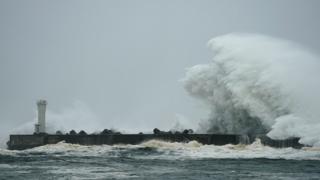Typhoon Hagibis: Japan braced for powerful storm
Typhoon Hagibis could be the worst to hit Japan since 1958 when more than 1,200 people died. …

 Image copyright EPA
Image copyright EPA Japan is bracing itself for what could be its heaviest rain and winds for 60 years as Typhoon Hagibis edges closer.
Winds reaching 180km/h (111mph) could cause floods and landslides, the Japan Meteorological Agency has warned.
Tens of thousands of homes are already without power and one person died when a car overturned in high winds.
Shops, factories and train networks have been shut down while the Rugby World Cup and the Formula One Grand Prix are facing disruption.
Hagibis is due to make landfall near Tokyo later on Saturday.
Authorities have issued evacuation advisories in areas at particular risk, while supermarkets are running low as people stock up before the typhoon hits.
Even while the storm was still out to sea, tornado-like winds battered Chiba, east of Tokyo, damaging homes and toppling a car, killing its occupant.
What do we know about the typhoon?
Hagibis, which means “speed” in the Philippine language Tagalog, is forecast to hit the main island of Honshu.
It could be the strongest storm the country has faced since Kanogawa Typhoon in 1958, which left more than 1,200 people dead or missing.
“The typhoon could bring record-level rainfall and winds,” an official at the meteorological agency said, citing the risk of floods and landslides.
What will be affected?
The typhoon has made headlines due to its disruption of the Rugby World Cup and Japanese Grand Prix.
Two World Cup games billed for Saturday have already been cancelled, and declared as draws, while Formula 1 has cancelled all activities at the Japanese Grand Prix on Saturday.
But the impact on the local population could be serious.
People have been stocking up on provisions for the coming days on the advice of authorities, leaving supermarkets with empty shelves.
Only last month Typhoon Faxai wreaked havoc on parts of the country, damaging 30,000 homes, most of which have not yet been repaired.
Evacuation centres have been opened in some coastal areas.
Transport systems have also been affected, with bullet trains and flights cancelled.




